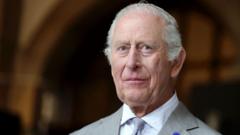The royal visit began with a grand welcome in Ottawa, where the King and Queen Camilla engaged in ceremonial activities, underscoring the strength of Canada's ties to the Crown.
King Charles III's visit to Canada is not just ceremonial; it comes at a time of heightened diplomatic tensions with the United States. Arriving in Ottawa, the King was greeted by officials, including Governor General Mary Simon and Prime Minister Mark Carney. The focal point of his visit is Tuesday's Speech from the Throne, an address that traditionally outlines the government's legislative agenda when parliament opens. This year, the monarch is personally delivering the speech for the first time since 1977, a notable break from routine.
This historic moment, which highlights the ongoing relevance of the monarchy in Canadian affairs, was initiated by Prime Minister Carney, who invited the King to underscore Canada's sovereignty amid strained relations with the U.S. The Prime Minister described the visit as a historic honor, emphasizing the necessity of unity and shared values. Governor Simon echoed this sentiment, suggesting the significance of the monarchy in strengthening national identity.
The royal couple’s arrival at Macdonald-Cartier International Airport was met with a ceremonial greeting, showcasing Canadian diversity through local representatives. Their agenda included a tree-planting ceremony at Rideau Hall and private meetings with Canadian leaders. On Tuesday, the King will receive military honors and deliver the pivotal Throne Speech before honoring fallen soldiers at the National War Memorial.
King Charles's previous statements highlight his support for Canada, presenting the country as a beacon of resilience. His subtle diplomatic gestures aim to reinforce the monarchy's position and relevance against the backdrop of fluctuating international relations. This visit, deeply rooted in history and tradition, promises to enrich the dialogue on Canada's monarchy in this modern era.
King Charles III's visit to Canada is not just ceremonial; it comes at a time of heightened diplomatic tensions with the United States. Arriving in Ottawa, the King was greeted by officials, including Governor General Mary Simon and Prime Minister Mark Carney. The focal point of his visit is Tuesday's Speech from the Throne, an address that traditionally outlines the government's legislative agenda when parliament opens. This year, the monarch is personally delivering the speech for the first time since 1977, a notable break from routine.
This historic moment, which highlights the ongoing relevance of the monarchy in Canadian affairs, was initiated by Prime Minister Carney, who invited the King to underscore Canada's sovereignty amid strained relations with the U.S. The Prime Minister described the visit as a historic honor, emphasizing the necessity of unity and shared values. Governor Simon echoed this sentiment, suggesting the significance of the monarchy in strengthening national identity.
The royal couple’s arrival at Macdonald-Cartier International Airport was met with a ceremonial greeting, showcasing Canadian diversity through local representatives. Their agenda included a tree-planting ceremony at Rideau Hall and private meetings with Canadian leaders. On Tuesday, the King will receive military honors and deliver the pivotal Throne Speech before honoring fallen soldiers at the National War Memorial.
King Charles's previous statements highlight his support for Canada, presenting the country as a beacon of resilience. His subtle diplomatic gestures aim to reinforce the monarchy's position and relevance against the backdrop of fluctuating international relations. This visit, deeply rooted in history and tradition, promises to enrich the dialogue on Canada's monarchy in this modern era.



















